Inside the Royal Children’s Hospital neonatal intensive care unit
IT’S a world where it can be weeks between cuddles for new parents. Ahead of the Good Friday Appeal, we meet the babies of the Royal Children’s Hospital’s neonatal intensive care unit.
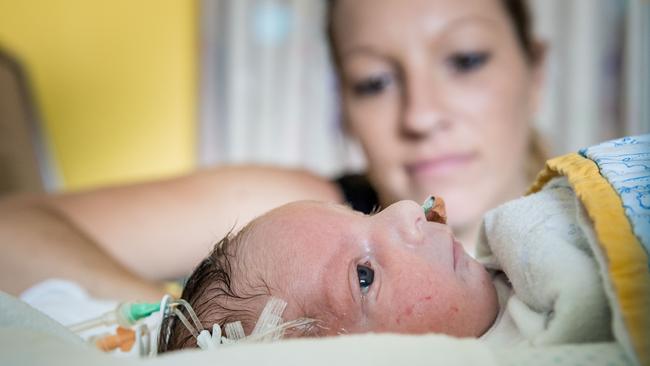
VIC News
Don't miss out on the headlines from VIC News. Followed categories will be added to My News.
Walking the corridors of the Butterfly ward at the Royal Children’s Hospital, it’s not easy, at first glance, to see where the patients are.
To the background noise of lullaby music, beeping monitors and cries that mimic the mews of hungry kittens, it is the machines and monitors towering over incubators and open-sided cribs that are most obvious.
But if you follow the tubes and wires from the ventilators and infusion pumps to the cots, they lead to the hospital’s tiniest patients, attached from most limbs to vital monitoring and breathing support to prop up organs too young yet, and too fragile, for this world.
Welcome to the neonatal intensive care unit, which cares for the sickest babies in the country.
This is a world where it can be weeks between cuddles. New parents must satisfy their nurturing instincts by sitting patiently by cribs with their pointer fingers grasped by their baby.
These are patients whose veins can be too small to access, and who rely on highly trained nurses to read the physical and psychological signs to interpret the pain scores of babies too small and weak to regularly open their eyes.
Here lie babies too unwell and fragile to breastfeed, and who are yet to learn the instinctual mechanism of breathing, sucking and swallowing at the same time. It’s a place where big milestones are measured in millilitres, grams and the number of dirty nappies. It’s where graduation from continuous to two-hourly feeds through a spaghetti-thick tube directly into the stomach is a milestone worth celebrating as a step closer to home.
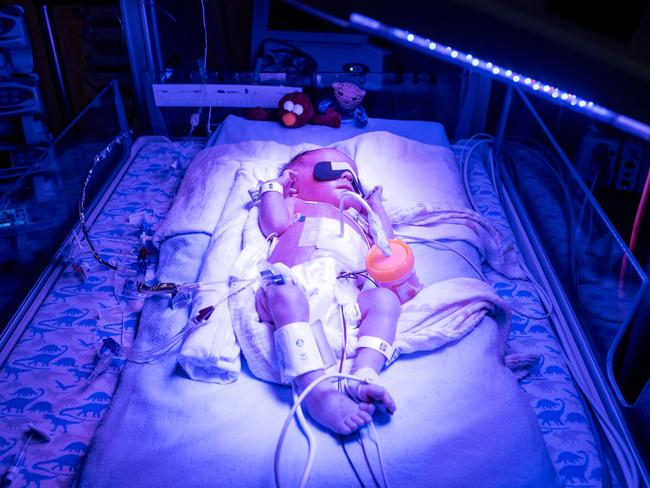
Many of the 900 families from across the state, country and even overseas whose child spends time in NICU talk about the “rollercoaster ride”.
It’s not a cliche. Every day can throw a curveball or unexpected setback for babies born months before their due date or fighting devastating illness, either in the intensive care wings of the ward or high-dependency unit for the more stable patients.
The unit will know about many of the babies before they are born, when prenatal scans pick up deformities in organs. The parents often have a chance to visit NICU before birth;
to see the machines that will surround and attach to their newborn, and find out about other services they can tap into.
So advanced are prenatal scans, common conditions picked up before birth include diaphragmatic hernia. This defect in the diaphragm allows the bowel to move up into the chest. Oesophageal atresia is another regular admission, where the upper portion of the oesophagus doesn’t meet the lower end and the stomach, requiring staged surgery over the first six months of life to make a functioning food pipe.
In others, problems are only evident upon birth. Some babies arrive needing specialist medical or surgical care that only the RCH can provide in Victoria, or needing breathing support for chest infections or septic shock.
This can see the mother stranded at her maternity hospital, trying every bargaining trick to be discharged and reunited with her newborn.
Still, the unit sees problems it has never come across before. This problem-solving challenge, which can only be cracked by collaborating with medical and surgical colleagues from other departments at the hospital, drew acting NICU director Dr Amanda Moody into the neonatology specialty.
“You’ll have a cardiologist whose focus is the heart, or a respiratory specialist whose focus is on the lungs. Our focus needs to be on the whole baby,” she says. “One of our really important roles is when we have a baby with several problems, we need to make sure all the specialty doctors are working together to co-ordinate each particular aspect of care.”
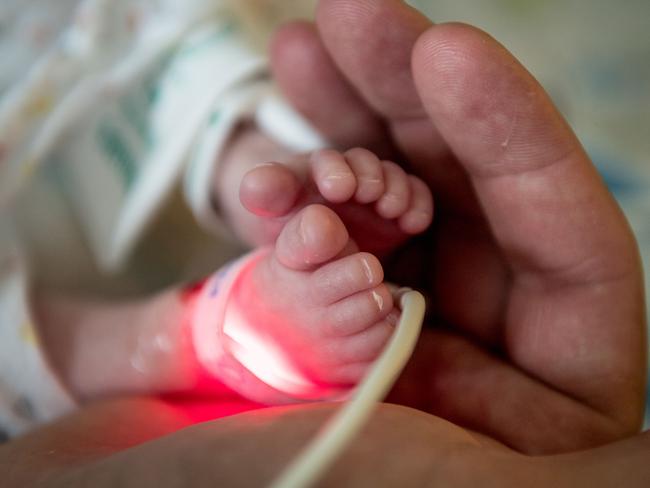
With so much control taken away from the parents, the unit has implanted a new model
of care called COCOON — circle of care optimising outcomes for newborns — to improve engagement between newborns and their families, despite the physical restraints.
Parents are encouraged to change nappies and the syringes of milk that pump milk directly into their baby’s stomach. They can give babies sponge baths, and hold them on bare chests for enriching skin-to-skin contact.
“Seeing your baby on a ventilator, with lots of tubes and pieces of plastic coming out of them would be quite daunting,” Moody says.
“Enabling the family to do as much as their baby is able to cope with is important, both for the baby and the parents. It’s really nice when you walk into a room and see an older sibling who has their baby brother or sister on their lap for a cuddle. It’s really sweet, and so important for the family at that time.”
Moody’s office is plastered with photos and drawings from her once-tiniest patients.
“I have a bunch of kids who are six or eight now and I hear from these families every Christmas,” she says. “It’s really lovely to forward these to the rest of the team so they can also find out what happens to these babies when we don’t need to see them any more, when they’re growing up being well and healthy.
“I love the ability to make a huge difference to a baby, and by extension, their family.”
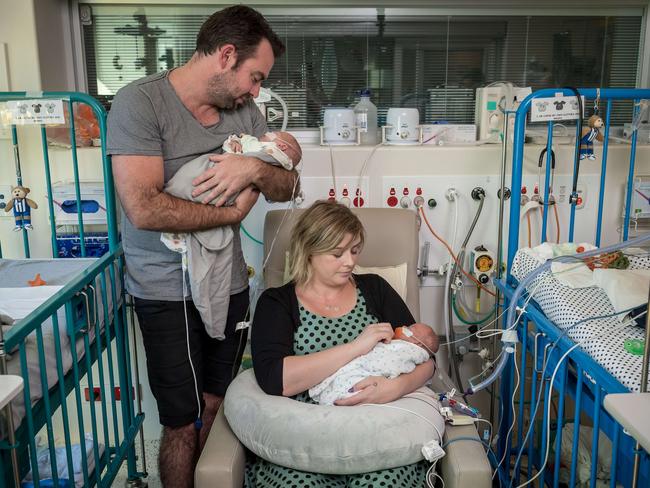
WILLOUGHBY AND WOLFGANG BENNETT-BRINN
Wolfgang Bennett-Brinn looks at his brother Willoughby, his eyes wide in disbelief.
The babies lie side by side in the same cot in the Royal Children’s Hospital neonatal intensive care unit. A video of this momentous snapshot in time — one that seemed destined to be robbed from parents Kate Brinn and Adam Bennett — is captured on Kate’s phone.
With their arms wrapped straight by their sides in muslin and sporting matching feeding tubes, it appears Wolfgang is asking, “Where have you been, bro?”
It had been 62 days since the identical twins were last together, in the womb, when this video was taken.
They had been separated across two hospitals as they fought the health problems that beset severely preterm babies when they arrive with a body not yet ready for the physical demands of this world.
Four times in as many months, the couple were told one of their sons most likely would not make it.
Born in the grey zone of life and death, at 23 weeks and four days, the boys — better known as Wolfy and Will on the ward — continue to defy the odds each day.
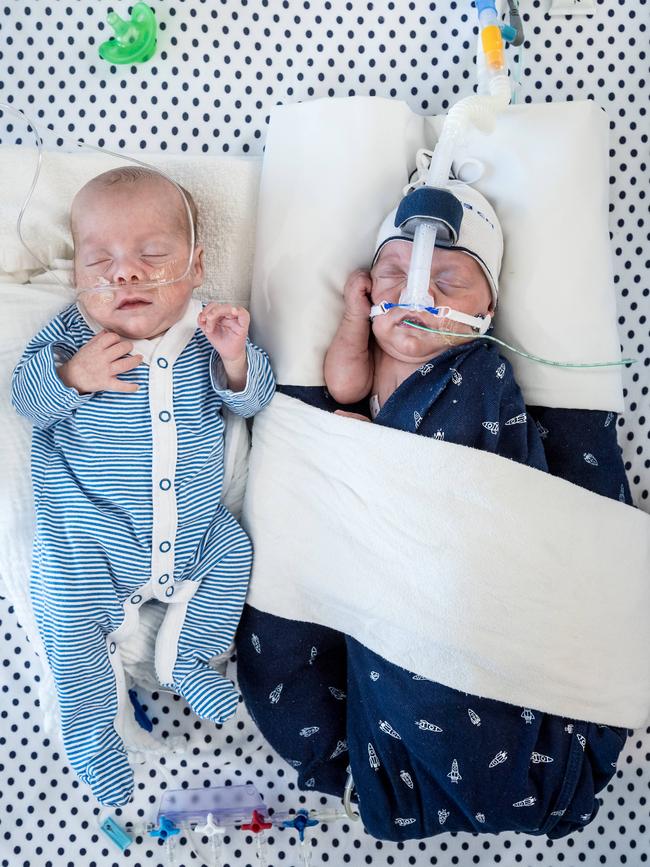
“You have your guard up the whole time so you can go in and see them and leave them there,” Kate says. “It’s quite traumatic on a daily basis to go in and not be able to take your babies with you.
“There is a big misconception with prem babies that they’ll be fine; they just need to put on some weight and they can come home.
“But there are so many things they go through. By the time Wolfy comes home, they’ll have had six surgeries between them.”
Such is the precarious nature of life at this stage of gestation that parents are given a choice as to whether their baby should be resuscitated if born not breathing.
Such is the immaturity of their immune systems and organs, and the translucency of their skin, that the risk of disability is high.
The parents, who both work in the disability sector, are realistic about the fact that many
of the hurdles the boys may face, whether physical or intellectual, may not reveal themselves for many years.
On that day captured on video on March 6, when Will was transferred from the Mercy Hospital to the RCH for laser eye surgery, the boys were placed in adjoining rooms.
Despite each limb being attached to monitors and probes, three nurses worked to make the impossible possible.
They set a chair in the middle of the two rooms and stretched cords from the monitors far enough so Kate could hold both her boys for the first time together — almost nine weeks after they were born.
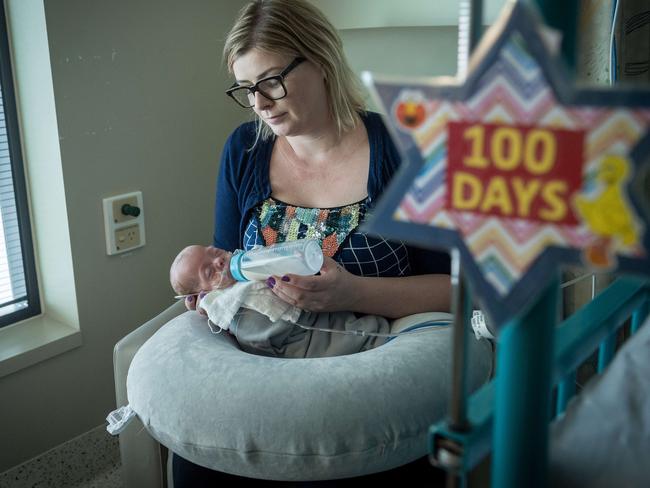
The Reservoir couple took Willoughby home from the RCH last weekend for the first time. Still attached to an oxygen bottle that rides in a sidecar on the pram, he had been in hospital for 108 days.
They held Will for the first time when he was seven days old. It was around this time that Wolfy started to deteriorate, quickly.
“You soon learn what the good beeps are, the bad beeps and the really bad beeps,” Adam says.
Three times over summer, doctors warned the couple they could lose Wolfy that day.
On Christmas Eve, his abdomen started filling with blood and doctors didn’t know why. He was too small and too unstable to be operated on.
“They’d never seen anything like this before,” Kate says. “We were sitting in a room with two consultants who were saying that if blood tests don’t come back normal, they were withdrawing care because it wasn’t fair on him.”
The parents had their first hold of Wolfy that day, at 10 days old. Doctors wanted the pair
to hold him for the first time before he died.
Over the next week his condition slowly improved enough that he could come off
the ventilator.
On New Year’s Eve, he went into septic shock, but again he fought back. An ultrasound revealed he had a bowel perforation, and it was then decided he would be transferred to the RCH.
It was largely a silent car ride as the couple followed the ambulance from the Mercy
to Parkville. The only conversation was spent analysing the move.
“We thought, if they’re transferring him, they must think they can do surgery,” Kate says. “Previously, it wasn’t even an option.”
Paediatric surgeon Michael Nightingale warned them, “This surgery will be exploratory. I don’t know what I’m going to find. He will likely die on the operating table, but if you don’t do this he definitely will.”
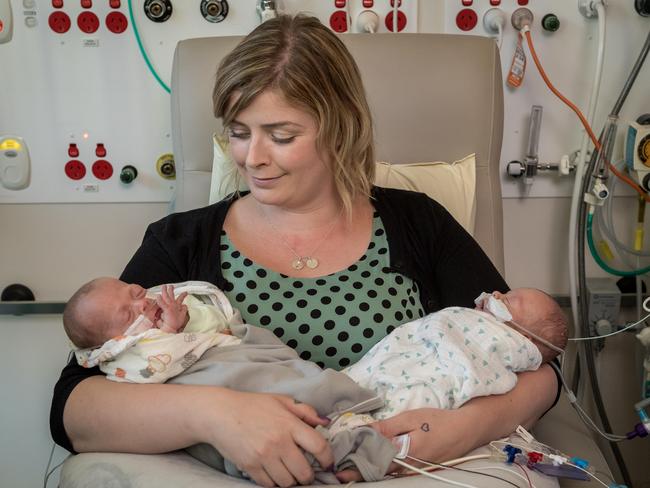
Kate says, “You’re guided by their expertise. They’re very compassionate, but they’re really upfront.” Wolfgang again defied expectations and survived the surgery.
But on Australia Day, Kate and Adam were on their way to catch up with friends when they received a call from the unit, saying, “You need to come in because he’s slipping away.”
Wolfy’s next challenge was to rally after developing the common premature bowel condition necrotising enterocolitis, which sees part of the bowel die. Wolfy needed 14cm of his small intestines removed.
Wolfy didn’t want to be touched or held during this time. Just being cradled by one hand capping his head and another holding his feet was all his could tolerate. Now he has progressed to the “burrito wrap”, another unique measurement on the ward for charting the progress of the littlest patients.
The chart at the end of his bed explains he likes cuddles with his parents and his own clothes, but hates eye tests and “general interference”. His brother, on the other hand, likes head massages, his dummy and to be wrapped up, but dislikes reflux, waiting for bottles and dirty nappies.
Last week was a time of big milestones for Will. He lasted 10 hours off ventilation during his air test.
Will was discharged to Care by Parent on Tuesday of last week. It is an accommodation wing at the hospital where parents can get used to caring for their child after a long and complex hospital stay, with ready access to medical staff before they return home.
It’s a scary concept. For almost four months most of Will’s limbs have been attached to probes and monitors. The screen next to his bed has given his carers a real-time update on his vital measures.
Now that he is disconnected from the monitors, they wonder how they will know if he is OK.
On their first night caring for their son alone off a hospital ward since he was born 15 weeks ago, none of them slept a wink. Will has only known the sounds of constant chatter and
the whirr of machines on the ward. The room was too quiet for him to fall asleep.
Adam recorded sounds from the ward that day to play overnight. It worked the next night.
But typical of the premature baby rollercoaster, this independent living lasted just three nights. Will started losing weight and was admitted back to the NICU ward for another two nights.
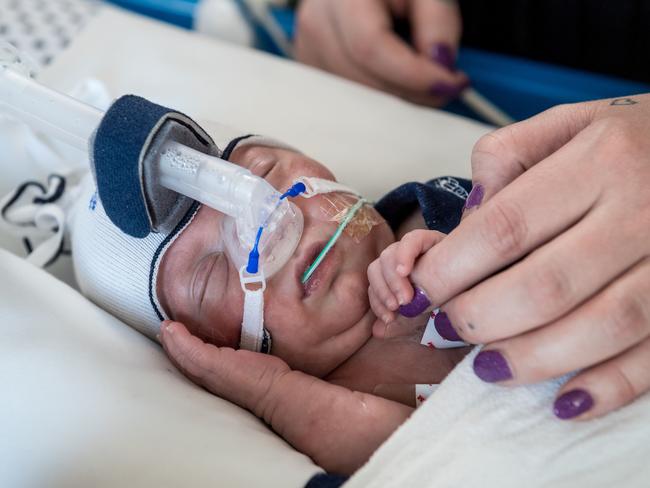
Also last week, Wolfy’s condition deteriorated and he was moved back to the intensive care wing of the ward. Tiny plastic prongs pumped oxygen into his lungs, which weren’t quite up to the job on their own.
“Most parents complain about crying, but you want them to cry because that’s when you know they’re getting better,” Adam says.
The next step for Wolfy is to have a fluoroscope X-ray to determine how his bowel is healing, to better plan his upcoming surgery.
Kate and Adam spent their first night at home with Will on Sunday. They played an app of ambient sounds as they all tried to drift to sleep, ahead of another day back at the hospital by Wolfy’s bedside.
Will fell asleep to the app playing the noises of an airconditioner.
“We feel hopeful for them because the major signs that something could be wrong aren’t there,” Kate says. “But because they are so premature, there is always the risk of developmental problems.
“I just want them both out of hospital, to be healthy and doing everything they want to do with their life.”
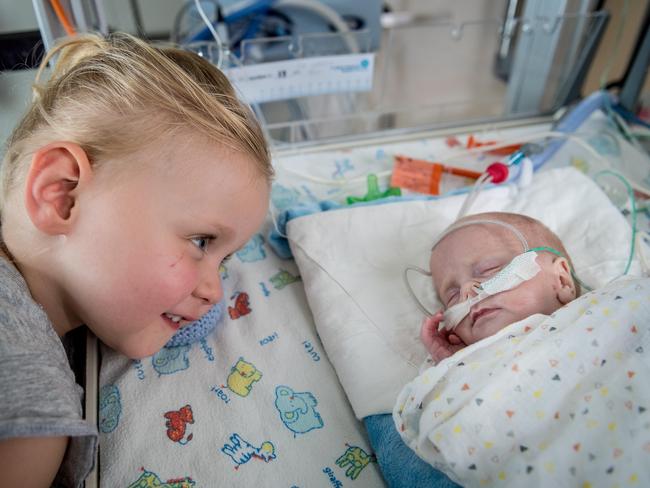
LOUIS RUNDELL
Every night before bed, three-year-old Isabelle Rundell would press her head to her mum’s stomach, giving it a kiss.
“Goodnight, Baby,” she would say. “I can’t wait to meet you.”
The sweet nightly gesture was the one constant during a pregnancy that risked being snatched away from Geelong parents Miranda and Luke at any stage.
At 11 weeks gestation, Miranda started to bleed. At 16 weeks, an ultrasound showed the placenta was abnormal.
The busy veterinarian nurse was put on strict rest for the rest of her pregnancy. On doctor’s orders she could no longer pick up Izzy, take walks, go to work or drive.
“He was never going to go the distance,” Luke says. “It was just a matter of how long we could get him through.”
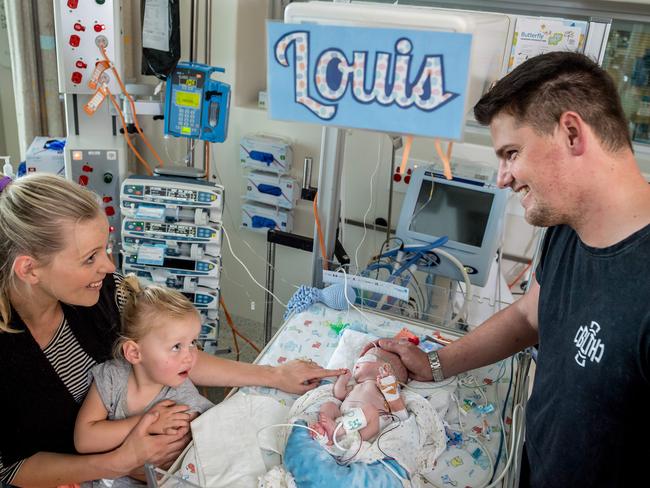
They were aiming to reach 34 weeks, but on February 19 — at 29 weeks and four days gestation — the placenta started to separate and Louis needed to be delivered that day
to save his life.
“It was hard, but you do it for him. It was all worth it,” Miranda says.
The Newborn and paediatric Emergency Transport Service (NETS) ambulance took Louis from Geelong to the Royal Women’s Hospital, where he stayed for three weeks.
For the first few days, with Miranda still in hospital and separated from her newborn, Luke wore a path along the Princes Hwy, ferrying breast milk between the hospitals and taking precious photos of their boy.
It was soon discovered Louis had a growth in his throat, most likely caused from a nick by the breathing tubes needed to stabilise him for transport on his first day of life.
After three weeks he was moved to the RCH, where it was found he had an incarcerated hernia. It’s a common scenario in premature boys, where the channel the testes travel down from the abdomen to the scrotum doesn’t close, so a hernia develops.
Surgery for the hernia was done that first night, and he had surgery on his throat two weeks ago.
“His lungs need to mature and get stronger, but there is now light at the end of the tunnel. We’re starting to feel that now,” Luke says. “He’s not as reliant on all the technologies he’s been on. He’s back on feeds.”
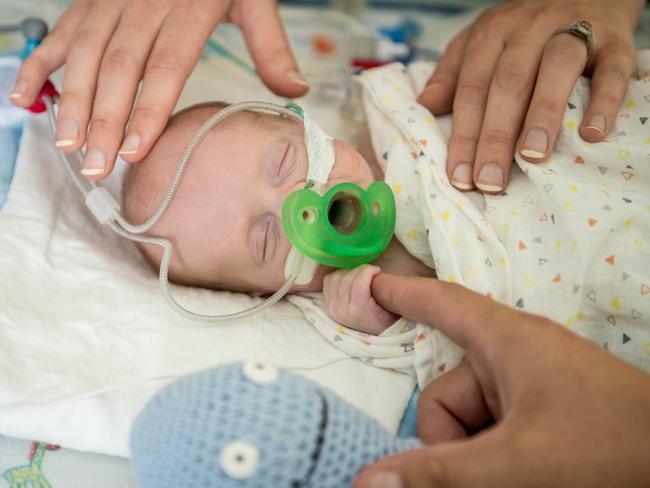
The family has moved from Geelong to Melbourne to be by their son’s bedside every day. Their dog is being looked after by family, and Miranda’s mum Liz O’Brien has taken leave from work to look after Izzy.
The couple can hold Louis every second day, but also help with giving his feeds through the tube, changing his nappy and washing his face.
Seeing her brother lying attached to drips and probes and tubes in an incubator, Izzy must think this is how all babies arrive into the world.
“We used to get stressed about the monitors at the start, but now we’re a lot more relaxed about it,” Luke says. “In the beginning we’d spend all day by the bedside watching the monitor.
“You’d go home, close your eyes of a night time and see it ticking over in your sleep.”
The couple went almost two weeks without being able to hold Louis. In the meantime, Miranda relied on circling two fingers in gentle strokes on her baby’s head to soothe him.
“He was just so sick. Now we can have a cuddle every second day,” she says. “We just need to let him get his strength back.”
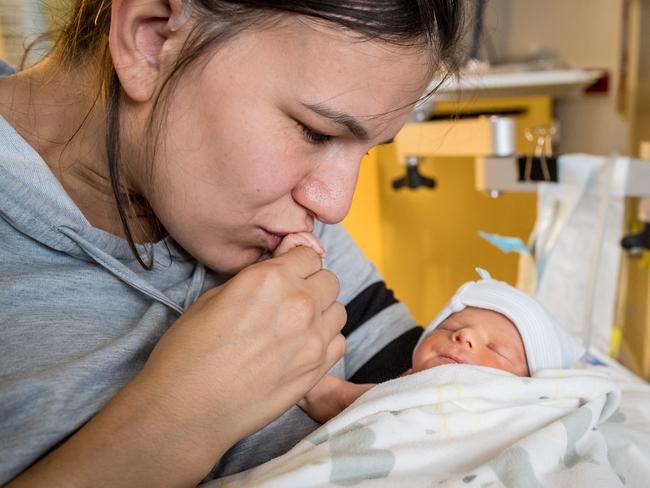
TOBY HOWARTH
Alisha and Jamie Howarth have spent every day by the bedside of their son Toby since he arrived two weeks ago.
It wasn’t until he was born that they discovered the trifecta of medical problems that he will be treated for over a significant chunk of his first year of life.
“The first couple of days were full-on, because we were thinking we were going to have this baby in an incubator for a little bit — a couple of weeks — and then he’d be home,” Jamie says.
“It’s not like that at all. It’s still a bit of a whirlwind at the moment.”
Toby was diagnosed with a combination of the rare and related congenital conditions tracheoesophageal fistula and oesophageal atresia, better known as TOF-OA, in which the oesophagus isn’t attached to the stomach.
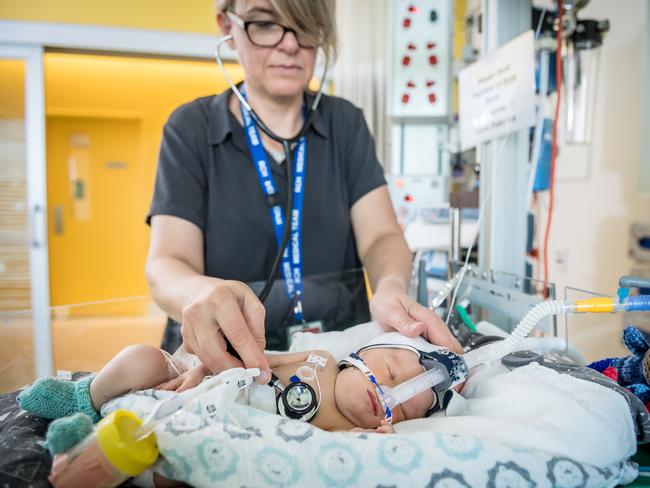
He is also missing a thumb and has no opening at the end of the digestive tract.
When they return home to Diamond Creek each night, to be with their two-year-old daughter Montana, Alisha says she constantly thinks about her two-week-old son.
“I just felt so much love for him, looking at him for the first time. I was happy he was out safe,” she says.
“I have that urge now to always be with him, always think about him.”
When Herald Sun Weekend first captured four-day-old Toby on the ward, he was under phototherapy lights to treat jaundice.
With the gap between both ends of the oesophagus too wide to reattach at the moment, the couple now must wait about 6-8 weeks before Toby will be big and strong enough for surgery.
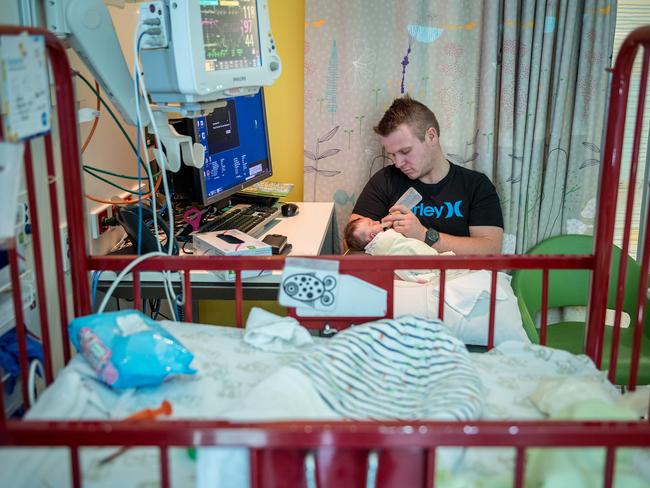
OAKLEY RAY
THE hardest part of rallying around the newest addition to the Ray clan is the separation.
It is the first time the family has not all been together, since parents Karla and Adam needed to move with their two children from Tasmania to Melbourne ahead of the complicated arrival of their third child.
An ultrasound at 20 weeks picked up that they couldn’t see baby Oakley’s stomach. It was most likely the combination of the rare and related congenial conditions tracheoesophageal fistula and oesophageal atresia, better known as TOF-OA, in which the oesophagus isn’t attached to the stomach. This was confirmed at birth.
The Rays moved to Melbourne from their home in Penguin, in northwest Tasmania, at the end of February ahead of the birth on March 10.
Oakley was admitted to the neonatal intensive care unit at the Royal Children’s Hospital on the day he was born.
He was in the operating theatre two days later for surgery to have the two ends of his oesophagus joined.
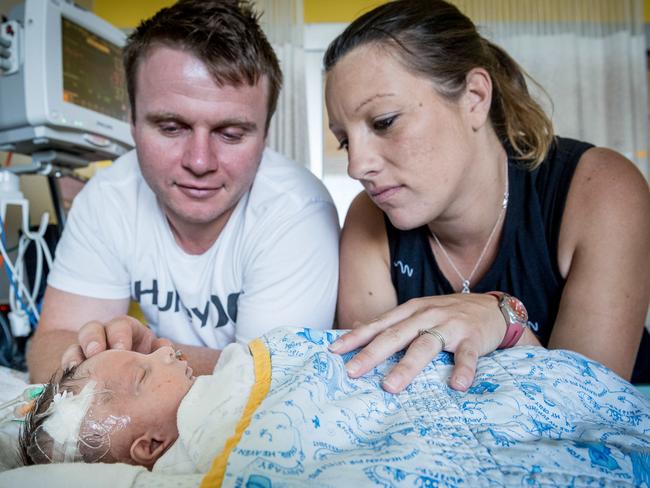
With so much of Oakley’s health out of its control, the family is relishing the chance — with the support of nurses — to seize back the chance to enjoy normal family moments.
Oakley’s leads and tubes are piled neatly into his pram so the family can go on walks outside the hospital. Marley, 2, also gets regular holds of her little brother.
After more than six weeks in Melbourne, Adam has returned home for a few days to keep the family business ticking over. He will return with son Noah, 11, so they can all spend the school holidays together.
The next step is waiting until Oakley puts on enough weight and is strong enough to fly to hospital in Hobart, a step closer to returning home to Penguin.
“They say time heals everything, but sometimes the more time that goes past, the harder it gets,” Karla says. “The term ‘when we get home’ is mentioned a lot. We’re very close-knit.
“We’re making the best of it we can and just keep on keeping on.”
To donate to the Good Friday Appeal go to: goodfridayappeal.com.au


